Woyzeck: Introduction
In 2000 the Tom Waits community was still enjoying the release of "Mule Variations" as it was suddenly announced there would be another main event. Tom Waits and Robert Wilson were going to collaborate on their third play called "Woyzeck". Again: Tom Waits: author of music and lyrics, Wolfgang Wiens: adaptation/ dramaturgy and Kathleen Waits-Brennan co-author of music and lyrics.
The play premiered November 18, 2000 at the Betty Nansen Theatre in Copenhagen/ Denmark. It went on tour in 2001 (with all of the dialogue spoken in Danish and most of the songs in English) and in 2002 (performed entirely in English).
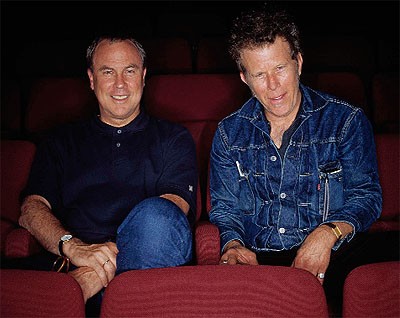
Robert Wilson and Tom Waits at The Betty Nansen Theatre.
Copenhagen/ Denmark. Summer, 2000.(3)
Tom Waits (on Robert Wilson): "He's like a scientist, medical student or an architect - he has that quality when you first meet him. He also probably has an attention deficit disorder, dyslexia and probably a little compulsive disorder syndrome, too. I must have recognised aspects of myself in him. He seems almost autistic as he's compelled to communicate, but has the limits of certain known forms of communication, and he's gone far beyond in developing others. "In theatre, he's developed a whole language for himself and those he works with ... right down to the way he has people move. He's compelled to create a world where everyone conforms to his laws of physics. He has everyone move real slow, because you can't grasp the full drama of a movement onstage that happens in real time, it won't register with you. It makes you think about the simplest movement, the act of getting out of a chair or reaching for a glass. "When I met him I felt I was with an inventor, Alexander Graham Bell or one of those guys. He's a deep thinker, a man who chooses his words very carefully and is not to be trifled with. We found out we were very different, but there was something that we both understood about each other, which was as a good thing. If you're too much alike, there's not much you can learn from each other."(7)
Tom Waits (on Robert Wilson): "Wilson, he's always playing with time. I heard a recording recently of crickets slowed way down. It sounds like a choir, it sounds like angel music. Something sparkling, celestial with full harmony and bass parts - you wouldn't believe it. It's like a sweeping chorus of heaven, and it's just slowed down, they didn't manipulate the tape at all. So I think when Wilson slows people down, it gives you a chance to watch them moving through space. And there's something to be said for slowing down the world."(9)
Tom Waits (on Robert Wilson): "We met in New York City. My wife and I had written a play called "Frank's Wild Years". We asked Bob if he would direct the play, and one thing led to another. We didn't actually do that project, but we went on ultimately to do two other projects together. We did "The Black Rider" and "Alice", both with the Thalia Theatre. I agree that we're different men with different approaches to work with. The fact is, I think that if two people do know all the same things, then one of them becomes immediately unnecessary. There's something that I deeply respect about Bob's world view, it's sensitised me for the way that I think that now I see the world."(10)
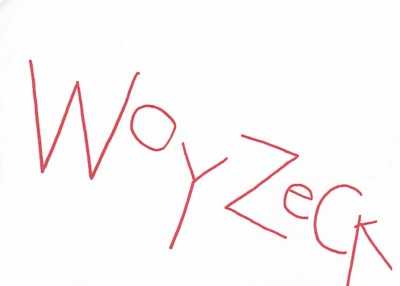
Cover for the "Woyzeck" program, 2000-2002(4)
"Woyzeck is the story of a poor soldier who tries to survive in spite of the daily humiliations of life. In order to support his wife Marie and her little son he is forced to sell his body to scientific experiments. He pays with his mind. Whereas Woyzeck's love for Marie is great and devoted, the money he can offer her is little and insufficient, and when he finds himself defeated by the flashy and fiery drum major, his worn out faith in the justice of life crackles. Woyzeck seeks comfort in the arms of another woman, gets drunk and suddenly finds himself holding a bloody knife. In front of him lies Marie's dead body. Woyzeck is the story of a man's gradual degradation; of an evil life trap between nature and nurture; of losing the woman you love and the meaning of life. Georg B�chner's Woyzeck is 164 years old and yet it is, more than anything else, a modern depiction of the eternally rotating madness which any man must feel when the earth beneath him crumbles and life is much harder to bear than Death."(19)
"Georg B�chner has been called the most modern classic in German literature and it is true in as much as that his three plays, which were all written more than 140 years ago, are performed more frequently today than ever. Especially Woyzeck has been the subject of numerous theatrical and literary interpretations since the first performance in 1913. Up to that time it was B�chner's first play "Danton's Death" that had kept his name alive through the years. Actually, Woyzeck had been printed as early as 1879, but it had not caused much attention at the time. It was not until the artistic expressionism that emerged around World War I, that people were able to appreciate the unique originality of the play, its linguistic scarcity and precision, the abrupt almost cinematic changes of scene and the naked, anti-lyrical delineation of character. Curiously enough, it was a composer, namely Alban Berg, who cleared the way for the work's triumphant progress with his opera, Wozzeck in 1925. The title was the result of the original publisher's misreading of the name in the manuscript, and this is due to the fact that Woyzeck is actually only a fragment. Because B�chner died only 23 years old while he was still working on the play. Even though several of the poet's friends claimed that at the time of his death the manuscript was available in a form which B�chner himself considered more or less final, his family withheld the remaining papers for more than 40 years. When the author Karl Emil Franzos was finally given access to the manuscript in the 1870s, the handwriting was so faded that it took the use of chemical fluids to decipher the text approximately. But there were no page numbers and the bundle of papers, which Woyzeck was written on, was an awful mess. Since then the chemical fluids have made the paper crumble, so it has never been possible to find a definite Woyzeck. Consequently, every new Woyzeck is the result of a selection, a kind of adaptation of the manuscripts that are available." (1)
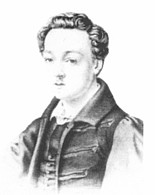
Georg B�chner
"Woyzeck is a fantastic visually evocative text, which is considered a major dramatic work in modern theatre history. This fragmented and nightmare-like fable is based upon the true story of Woyzeck, a soldier who murdered his girlfriend in Leipzig in 1821. With insight and social indignation B�chner portrays a man, who is subject to the laws and rules of a merciless society, and in a series of surreal snapshots he shows us a man, who is completely subdued by the will of society and his superiors. Woyzeck is seen and treated as a social experiment. He is alternately employed, unemployed and employed again. Only one thing is certain: His desperation, social as well as emotional, and his isolation from the rest of the world grows bigger every day. Woyzeck is "only made of sand, dust, dirt and filth", as it is said in the play - and in a relentless society he learns this bodily. Woyzeck is a very modern, political drama, which tells the story of how all human values are destroyed when society pushes the individual to the brink of survival. The tightness and linguistic expressionism of the text are an obvious take-off for Wilson's abstract idiom and imagery. Perhaps that is why Robert Wilson himself has always dreamt of working with B�chner... " (1)

<object classid="CLSID:22d6f312-b0f6-11d0-94ab-0080c74c7e95" codebase="http://activex.microsoft.com/activex/controls/mplayer/en/nsmp2inf.cab#%20Version=5,1,52,701" height="46" id="MediaPlayer1" standby="Loading Microsoft Windows� Media Player components..." type="application/x-oleobject" width="320"><embed autostart="0" height="46" name="MediaPlayer1" pluginspage="http://www.microsoft.com/Windows/MediaPlayer/" showcontrols="1" src="http://www.tomwaitslibrary.info/audio/woyzeck-intro.m3u" type="application/x-mplayer2" volume="-300" width="320"></embed> </object>
Listen to audio excerpt of Woyzeck theatre intro.
Betty Nansen Theatre. Copenhagen/ Denmark. November 20, 2000.
Tom Waits: "It's a story that continues to surface in Europe. Wilson told me about this lowly soldier who submitted to medical experiments and went slowly mad from taking medications and herbs. He finds out his wife is unfaithful. He slits her throat and throws his knife in the lake, goes in after it and drowns, and then his child is raised by the village idiot. I said, "OK, I'm in. You had me at 'slit her throat.' "(6)
Tom Waits: "Well you know with stories the hard part of getting the truth out of anybody is that the people who really know what happened aren't really talking and the people who don't have a clue are diving across the table for the microphone. And who knows what really happened in the actual story, it really doesn't matter anymore because it's now a story. And once something becomes a story it's like a hammer or it's a tool or it's a vehicle. It deals with madness and children and obsession and murder - all the things that we care about and care about as much now as we did then. It's wild and sexy and curious and catches your imagination and makes you wonder about the people in it and it makes you reflect on your own life. So I guess those are all the things you want from a story and find them interesting 500 years later. The first thing that you realise, and it's widely talked about, is that it's a proletariat story. A story about a poor soldier who is manipulated by the government and has no money, is used to experiment on and slowly becomes mad. I guess if they had anti-depressants in those days they could have straightened him right out."(10)
Tom Waits: "I didn't know anything about Woyzeck. Kathleen knew more than I, but I didn't really know the story or anything. I was just told the story in a coffee shop in Boston over eggs a few years ago."(8)
Tom Waits: "This was considered one of the first proletariat operas, in that it dealt with the working class, so that was attractive to me."(9)
Tom Waits: "The story is about a guy who starts taking money to participate in experiments, so he goes a little crazy, and his wife is unfaithful, so he kills her and kills himself. So his child is left to be raised by the village idiot, this real witch of a woman. So it's got, you know, all the things you'd want from opera."(11)
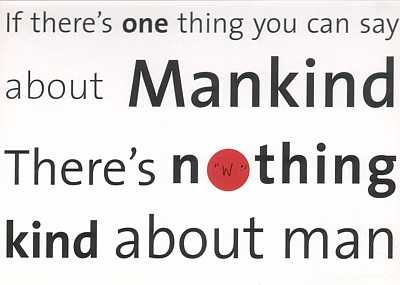
Promotional postcard quoting from "Misery River".
Photography by: The Ocular One. Layout: FRK Madsen
Tom Waits: "I guess I'm drawn to the carnival. You know I went and watched [the Hitchcock movie] Strangers on a Train to get some inspiration. It's so impressionistic, but it does draw from life. And then it becomes something very different from that. You kinda go along with the experience of working with Wilson, which is kind of like being an astronaut for a few months. You do feel sometimes you're sitting out there in the dark at a little table with these little lamps like you're at Cape Canaveral. And something otherworldly is being witnessed. Not sure where you're going, got plenty of oxygen, but . . . we like it [laughs]. For a sober person, like myself, it's the closest thing to a drug experience [laughs]".(2)
As in The Black Rider and Alice, Waits himself did not perform in the play. There was however an unusual stand-in this time (a monkey puppet with Tom Waits' voice). As in The Black Rider and Alice, Waits had to teach the songs to the players. As always Waits had a hard time doing so.
<object height="344" width="425"></object>
Low-res video of "Misery River" as featured in the opening scene of "Woyzeck"
Woyzeck/ Betty Nansen theatre promo, 2000
Monkey puppet with Tom Waits' voice from tape
Tom Waits: "You really have to give it away and at the same time you really are kind of spotting somebody who's on the trapeze. You can't tell them to get down and let you up there so you can show them how to do it. You kind of talk them through it or want to say the right things. You want to be able to have them retain their confidence and at the same time be able to receive new ideas. Those are sometimes two mutually exclusive things. Some people take lecturing very well and others just want you to go away and let them do it the way they want to do it. It's difficult so you learn by doing."(10)
Tom Waits: "You know when you're trying to teach somebody how to do something you want them to do and they have very little frame of reference or irony? It's difficult sometimes to transmit that kind of nuance. Or sometimes you discover that your idea wasn't as good as theirs [laughs]."(2)
Waits has recycled some earlier ideas and compositions for this play. He has used an instrumental theme from Alice(15) for the prologue and for act 2.4 & 2.5. For "God's Away On Business" in act 1 he has included "There's A Leak In The Boiler Room" which he used before during the 1987 tour promoting Frank's Wild Years. For the same song he has also used the "Bacteria story" from 1985.(16) The "Bacteria story" was later referred to in Frank's Wild Years the play.(17) And an early version of "Just The Way We Are" was also used in Frank's Wild Years(18). In act 2 Waits has used the song "It's Over" (previously released on: Liberty Heights soundtrack album, 1999). And "Coney Island Baby" might as well be a Mule Variationsouttake (notice the Coney Island reference in "Take It With Me").
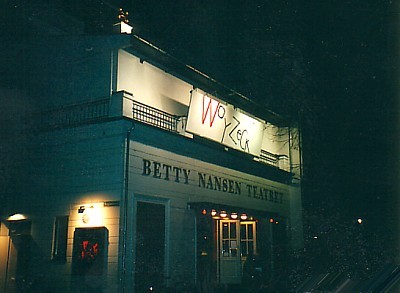
Betty Nansen Theatre. Copenhagen/ Denmark. December, 2000.
Photography: Tom Waits Library
Stagings (Wilson production) :
November 18, 2000 - February 2, 2001: Copenhagen/ Denmark (Betty Nansen Teatret)
September 1 - 8, 2001: Berlin/ Germany (Berliner Ensemble)
September 22 - 23, 2001: Stockholm/ Sweden (Dramaten)
October 3 - 6, 2001: Dublin/ Ireland (Gaiety Theatre)
October 13 - 14, 2001: Wroclaw/ Poland (Dialog Festival)
November 2 - 4, 2001: Madrid/ Spain (Festival de Oto�o)
November 9 - 11, 2001: Toulouse/ France (TNT Th��tre de la Cit�)
November 15-16, 2001: Rennes/ France (Theatre National Bretagne)
November 29 - December 9, 2001: Paris/ France (Odeon Theatre de L'Europe)
(Early and late show on December 1 and 8, 2001)
December 13, 2001 - February 16, 2002: Copenhagen/ Denmark (Betty Nansen Teatret)
September 16-17, 2002: Belgrade/ Yugoslavia (National theatre, performed in English as part of 36th Belgrade International Theatre Festival)
September 27 - October 5, 2002: London/ UK (Barbican Theatre, performed in English as part of the BITE:02 annual festival)
October 11 - October 13, 2002: Rome/ Italy (Teatro Valle - Prima Nazionale, performed as part of the RomaEuropa festival)
October 18-19: Sarajevo/ Bosnia and Herzegovina (performed as part of the MESS Sarajevo Festival)
October 29 - November 16, 2002: New York/ USA (Harvey Theatre, performed in English as part of the 20th Next Wave Festival)
December 3 - December 15, 2002: Los Angeles/ USA (Freud Playhouse, performed in English for UCLA Live)
Oct. 02 - Nov. 15, 2003: Betty Nansen Theatre in Copenhagen/ Denmark (Wilson production by the Betty Nansen Theatre).
September 19-24, 2003: Tokyo International Forum. Tokyo/ Japan. (English performance w. Japanese subtitles, Wilson production by the Betty Nansen Theatre).
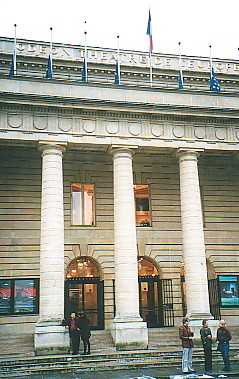
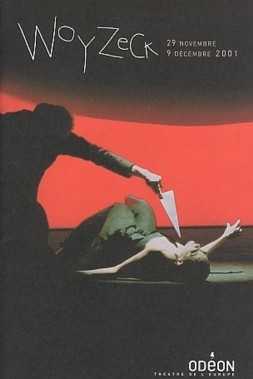
Left: Odeon Theatre de L'Europe. Paris/ France. December, 2001
Right: Woyzeck program, Odeon Theatre, 2001
Photography: Tom Waits Library
Tom Waits released a studio album called Blood Money (Epitaph/ ANTI) with the songs from the play, on May 7th. 2002.
Tom Waits: "We were going to call the album Woyzeck, but it was thought nobody knew who he was. Kathleen said, 'Let's call it Blood Money,' and that made sense. The guy's a lowly soldier who's offered money for medical experiments, which contribute to his loss of balance and sanity."(12)
Tom Waits: "Writing songs for other people is just mortifying at times. You stand by and watch other people completely butcher them. Sometimes they're completely elevated. But I figured I could improve upon most of them."(13)
Tom Waits: "It was already music for the eyes. But it was wearing to have other people singing the songs. They either elevate it or they butcher it, very little in between. Recording well, it seems, is the best revenge."(14)
Tom Waits: "With an album you fix it - you can wait until its exactly like you want it and then freeze it in time - but doing a piece of theatre is almost like putting a circle of rocks right here and then coming back in two weeks, expecting them all to be in the same place. But you still try to fix it, give it a skeleton - you should be able to know that it's an alligator or a flamingo even though it'll change position - and you work as if opening night is the night when it will be fixed in resin for ever, so you've got to have your whole look down and don't forget your hat. But as soon as you leave everyone goes `I hate the way that f**ker made me sing that song. He's gone now, so I am going to do it as I want." That's human nature. I'm the same way if I'm in a play. I've been in some plays and when the director's gone it's `Whew it's mine now. What's he going to do, come up in the middle of a show and take my hat off? Hell no.`" (20)
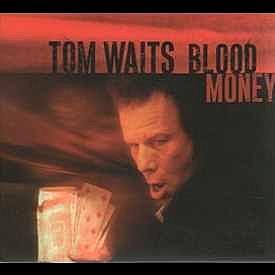
Tracklist:
1. Misery Is The River Of The World (4.25) Sung by Carnival Announcer (and entire cast) in prologue. Sung by Margret in closing scene
2. Everything Goes to Hell (3.45) Sung by Marie and the Drum Major in act 1, scene 6
3. Coney Island Baby (4.02) Sung twice by Woyzeck throughout the play
4. All The World Is Green (4.36) Sung as a duet by Woyzeck and Marie in act 3, scene 1
5. God's Away On Business (2.59) Sung by The Doctor in act 1, scene 4
6. Another Man's Vine (2.28) Sung by Drum Major in act 1, scene 4
7. Knife Chase (2.26) Instrumental played in act 2, scene 1 & scene 2
8. Lullaby (2.09) Sung by Marie in act 1, scene 3 and by Karl the Fool in act 3, scene 2
9. Starving In The Belly Of A Whale (3.41) Sung by The Captain in act 2, scene 2
10. The Part You Throw Away (4.22) Not performed in play
11. Woe (1.20) Sung by Woyzeck in act 3, scene 3
12. Calliope (1.59) Instrumental, not performed in play
13. A Good Man Is Hard To Find (3.57) Sung by Marie in act 2, scene 1
(Performed in the play but not on album: Diamond In Your Mind, It's Just The Way We Are Boys, Shiny Things, It's Over)
Notes:
(1) Woyzeck Press Release. � 2000, Betty Nansen Theatre
(2) Source: "Another Night at the Opera for Waits". Tom Waits discusses his latest collaborative foray into musical theater. By: Andrew Dansby. November 4, 2000. � 2001, RollingStone.com.
(3) Woyzeck promo picture. Photography by: Erik Hansen/ The Ocular One.
(4) Woyzeck Program: Editors: Kitte Wagner and Mette Wolf Iversen. Photography by Erik Hansen/ The Ocular One. Layout: Frk. Madsen. � 2000, Betty Nansen Theatre.
(5) From ANTI records site (April, 2002) at http://www.anti.com/
(6) Source: Waits: 'I hope more people misunderstand me' USA Today (USA), by Edna Gundersen. Published: June 17, 2002
(7) Source: "Everything Goes To Hell" Uncut 5th Anniversary Special. Take 61, June 2002 by Gavin Martin. Date: Flamingo Resort Hotel & Conference Center, Santa Rosa, CA. February/ March. Published: May, 2002
(8) Source: "Tom Waits" The Onion A.V. Club online magazine (USA), by Keith Phipps. Volume 38, issue 20. � Copyright 2002 Onion, Inc., All rights reserved. Date: Telephone interview. Published: May 29, 2002
(9) Source: "Woyzeck to run at Freud Playhouse". Daily Bruin (USA), by Andrew Lee. December 3, 2002
(10) Source: "Waits/ Wilson Woyzeck Promo Interview", 2000. Audio tape, video tape (Betty Nansen promo video)
(11) Source: "Tom Waits". SOMA magazine. July, 2002 by Mikel Jollett
(12) Source: "Everything Goes To Hell". Uncut 5th Anniversary Special. Take 61, June 2002 by Gavin Martin
(13) Source: "2 albums at once? That's Waits' way" Chicago Tribune (USA) May 5, 2002 by Greg Kot
(14) Source: "A double shot of Waits." Globe and Mail (Canada) May 7, 2002 - Print Edition, Page R1 by Carl Wilson
(15) Known as untitled track nr. 22 from "Alice The Original Demos"
(16) Tom Waits: "Rather than tell you what kind of stories I like, I'll tell you a story.' Waits says in his friendly growl. 'These two guys come out of a bar one night. They're not drunk, it goes without saying, and it's not much later than three in the morning. From down the street they hear someone singing. Opera. Now they're both opera fans - naturally - and one says to the other, "That's good. That's Puccini." And the other says, "No, it's better, it's Rossini." So they go closer and the singer's still going at it. It's a guy, and he's wearing a Stetson, and he's big, but not much bigger than a garbage truck, and he's singing at the top of his voice, like Maria Callas in "Figaro" or something "BACT-ER-I-A, BACT-EEEER-IA, BACT-EER-IA."' 'That is what I call a New York story," says Waits. ("Dog Day Afternoon" Time Out magazine (UK), by Richard Rayner. New York, October 3-9, 1985)
(17) Frank's Wild Years Act 1: scene 1, 1986. Frank (Introducing "Innocent When You Dream"): "Well... left to do another number, Ethel. Well, I been out on the coast for a couple of weeks when we were in Palm Springs. Ethel here's a little something... Eh, my own song. A little song I like to call Bacteria."
(18) Frank's Wild Years Act 1: scene 1, 1986
(19) Woyzeck 2002 theatre program. Program: Editors: Kitte Wagner and Mette Wolf Iversen. � 2000, Betty Nansen Theatre. Special thanks to Dorene LaLonde for providing the 2002 "Woyzeck" theatre program.
(20) Source: The Mojo Interview: Tom Waits Speaks Mojo Magazine (USA/ UK), by Sylvie Simmons. September, 2004

